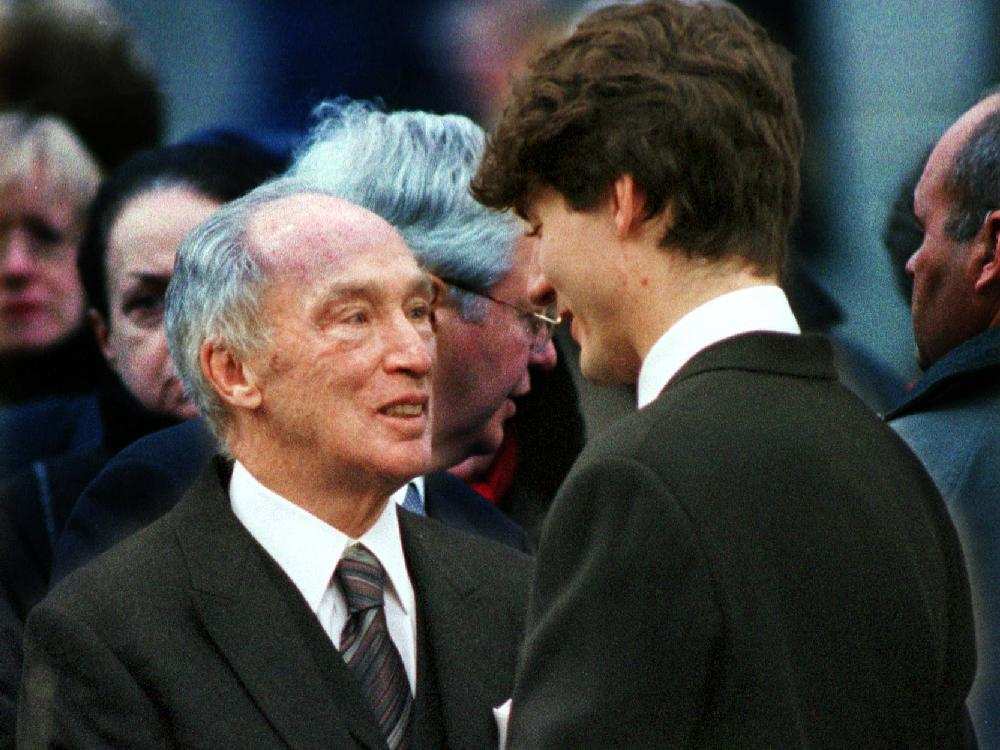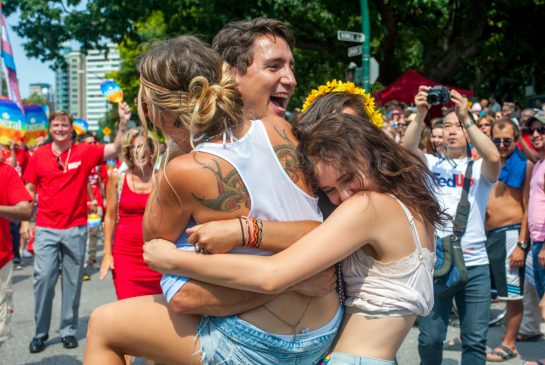
Photo credit: MediaBall.
TORONTO — The world casts a bleary eye upon this fair yet often frozen colony attached to the American colossus. I report six months into the restoration of the House of Trudeau to Canadian government, a fact that has made Canada of momentary interest to the larger world.
To begin: You’ll never hear this from a member of the Canadian Liberal party, but Prime Minister Justin Trudeau became such because of his last name. Simple truth: Justin Trudeau would not be prime minister of Canada if his name was Smith or Tremblay. It’s kinda like Monarchy, eh. We dig it here in the north. Hell, we even have an unelected Senate!
Seriously, on the basis of professional experience alone, Justin Trudeau has scant legitimate claim to running a G8 country. Teaching high school and snowboarding safety are not the usual pre-requisites. To make a comparison to head office down south: as the 2015 Canadian federal election began, Justin Trudeau had significantly less leadership experience than Donald Trump or Sarah Palin.
The inevitable economic shift that climate change will bring will cut to the quick in a cold country dependent on fossil fuels.
Give the man his due. He won. Despite the experience deficit, the mythological allure of the Trudeau name, plus the antipathy to former Conservative Prime Minister Stephen Harper after nine years and three administrations, plus an artful electoral campaign, plus the fact that the dashing Monsieur Trudeau is extremely easy on the eyes contributed to a mid-campaign resurgence of Trudeaumania among a sufficient number of Canadians that made him prime minister with a sizeable majority.
It turned out to be a scorched earth victory for Trudeau who easily looks a decade younger than his 44 years. Harper resigned within hours of the result. Last month, five months after the election, Tom Mulcair of Canada’s New Democratic Party (NDP), a democratic socialist outfit, also stepped down following a humiliating result at a leadership review by party members still stinging from Trudeau’s triumph.
So six months in to his tenure, Trudeau has as much power as any prime minister could possibly attain in the Canadian system. As well as his opponents being bereft of leadership, a generally supine mainstream media that all but salivated in anticipation of a Liberal restoration adores him, and a Canadian public are largely in love with the idea that Canada and themselves might be as cool, attractive and dynamic as their seemingly coltish prime minister.
Team Trudeau won the 2015 campaign with professional savvy and marketing panache. Images of Justin Trudeau magically stalling then rising on an escalator, paddling a canoe on the Bow River in Calgary under Hollywood-perfect lighting conditions, showing his excellent ass featured in a triumphal final campaign TV ad, and countless portrayals of him in shirtsleeves (right out of the Obama campaign playbook of 2007-2008) made him an irresistible force.

Father and son: So far, in no one's shadow. Photo credit.
By autumn of 2015, the world was ready for Justin Trudeau. A climate change summit in Paris allowed him to distinguish himself from his plodding (and to many, sinister) predecessor, the lumpy Mr. Harper. While there is little indication to date that Trudeau’s Canadian federal government will be more successful than Harper’s in achieving meaningful climate change action, the rhetoric was markedly different.
Later in the fall, he went to Davos where Trudeau the love child met international feminists who gushed about the new PM as an international celebity, over his cabinet of 50% women and his looks. The degree of privilege and contradiction represented in one colloquium featuring him with the likes of Melinda Gates talking about social justice and women’s rights went unnoticed as the world media joined hands with its Canadian partners in fawning over the new PM.
Real challenges confront Trudeau. From cod to beaver fur, bison hides, timber, gold, pulp and paper, potash and uranium to oil and gas, Canadians have become rich because of centuries of resource extraction. The inevitable economic shift that climate change will bring will cut to the quick in a cold country dependent on fossil fuels. It will take Trudeau’s considerable political skills to navigate a way through the political and economic reefs ahead. These reefs will also bedevil the traditional pro-developmental ideology of the Liberal party that Trudeau leads and on which his western partners depend.
Canada also faces a systemic, existential crisis in its relations to First Nations, Métis and Inuit peoples. Recent national investigations have revealed cruel racism at work in policies for education and social services for Aboriginal children and the lack of justice for a staggeringly disproportionately high number of female Aboriginal victims of rape, disappearance and murder. The Trudeau government promises action and reconciliation. So have its predecessors for the last four decades.
In Paris, he famously proclaimed that 'Canada is back.' He should have added, 'and we’re open for big international business!'
The intent of social justice for Aboriginal peoples will conflict with the Trudeau government’s commitment to fossil fuel pipelines and furthering economic ties to a non-democratic China, primarily via swapping Canadian resources, educational opportunity and real estate for cheap consumer goods. The oil and gas in pipelines invariably traverse environmentally sensitive Aboriginal territories in the Canadian hinterlands. The resources converted by the Chinese and others often lie under or on Aboriginal territories that are in dispute. Trudeau took power with a litany of promises of change delivered energetically and with an emphasis on positive thinking. Indeed in his victory speech, he credited his victory to 'sunny ways', which he said he adopted from the political style and philosophy of former Prime Minister Wilfred Laurier.
The opening to China is of particular significance in the history of the Liberal party. Trudeau père was famously on friendly terms with Chinese leaders of his era. Jean Chrétien, also a former Liberal prime minister, immediately began working as a legal advisor for Canadian firms in China following his retirement from politics. Shortly after Justin Trudeau’s election, Chrétien and his Chinese colleagues predicted a new golden era for Canadian-Sino relations. It’s unlikely the current Chinese regime, busily cracking down on dissent and further hardening the hegemony of the Communist Party, will do so by practicing ‘sunny ways.' Stephen Harper was notorious in the eyes of Canadian capitalists and political figures like Chrétien because he criticized China’s human rights record. Where will Justin Trudeau stand on this?
If the new government’s attitude in reaffirming a weapons deal with Saudi Arabia is any indication, Justin Trudeau will not be too concerned about human rights in China. The sale of armed vehicles to Saudi Arabia was brokered when Harper’s Conservatives were in power. In opposition, senior members of the Liberal party opposed it. Once in power, the deal was expedited by the Justin Trudeau government despite contrary advice from respected Canadian human rights organizations. Sunny ways, eh! In Paris, he famously proclaimed that 'Canada is back.' He should have added, 'and we’re open for big international business!'

Trudeau as Narcissus, by Bryce Hall, National Post. Used with permission.
So what’s really behind the handsome face and the great hair? I read his autobiography during the election campaign. This tome, released almost a year prior to the election while he served in opposition, is sometimes fascinating although gruelling to get through in its entirety (which I did). Long and repetitive sections read like the political equivalent of slogans destined for pharmacy greeting cards. The sections about his childhood and the break up of the marriage between his famous dad and his mother who suffered from bipolar mood disorder are often moving. However, when it comes to politics and Canadian history, the author Trudeau is relentlessly optimistic and naive to the extent of puerility.
In Trudeau’s account, his Liberal party has almost always been forever a steadfast defender of social justice. His hero (other than his father) is Prime Minister Wilfred Laurier who served in the late 19th and early 20th centuries. Laurier was a success because of his “sunny ways”. Trudeau fails to mention that the Liberal Laurier championed the aggressive civilization of Aboriginals, continued racially restrictive immigration policies and agreed to severely limit the language rights of a French speaking minority in the province of Manitoba despite being Canada’s first French Canadian prime minister. These are Canadian historic realities. Laurier was a man of his time and his political ways were not entirely sunny. For what it’s worth, I found Trudeau’s depiction of Canadian history self-serving and shallow. Of course the man is a politician, not a historian. Yet, a fact is a fact is a fact and should be treated as such. (An aside on the topic of books: Stephen Harper produced an admirable text about the history of hockey in Toronto while serving as prime minister. I was not a political supporter of Mr. Harper, but the man can write circles around Justin Trudeau. Harper’s hockey book succeeds as a straight forward cultural history.)
On the ever present issue of Canadian unity, Justin Trudeau echoes his father. Essentially their view is that advocates of Québec independence are deluded at all times in all ways and are not to be trusted even though indépendantistes have almost always exercised their option through peaceful, democratic means — in accordance with the Canadian constitution.
Justin Trudeau cleverly positioned himself to the left of the NDP during the 2015 campaign. His government’s first budget broke his electoral promise of three small deficits by delivering a current deficit that will balloon to $30 billion, a figure reminiscent of deficits of his father’s era. A recent election in the province of Manitoba delivered a Conservative majority that joins a like-minded government in neighbouring western province of Saskatchewan. With Canada’s only NDP government still freshly elected with a majority in Alberta, Trudeau will be hard pressed to placate western grievances and the concerns of Aboriginals and environmentalists in the resource rich west.

Girl magnet — on the road, in the parade. Photo credit.
Six months in, Justin Trudeau still enjoys great popularity. Liberal premiers in the important provinces of British Columbia, Ontario and Québec are eager to work with him. The honeymoon persists. The strains of Canadian federalism and, it says here, Trudeau’s relative lack of experience, mean it cannot last forever.
Trudeau’s electoral claims of progressivism may be borne out in social policy, however his foreign policy is consistent with the centre-right, globalizing emphasis of Harper’s Conservatives. On the international scene, he seems content to hold the line on Canada’s prevailing beliefs in free trade, standing shoulder to shoulder with Israel and generally accepting America’s leadership in world affairs while at the same time pivoting to Asia to benefit consumers. In la longue durée of Canadian history there is little to separate Liberals from Conservatives. The parties compete for the middle and the concerns of already privileged Canadians preoccupied with maintaining comfort and wealth creation. That’s the secret sauce of Canadian political success. As of today, Justin Trudeau and his team are holding fast to the recipe.
* Elbowgate, May 19, 2016: "Canada’s normally staid House of Commons erupted into chaos on Wednesday, after the visibly annoyed Trudeau marched into a group of MPs, grabbed Conservative Gordon Brown by the arm and led him out of the group." In the process Mr Trudeau elbowed a female member of another party. — The Editors.

JAMES CULLINGHAM is a filmmaker, historian, journalist and a professor of journalism and history at Seneca College in Toronto. He is also head of a media production company, Tamarack Productions, and is currently shooting a documentary about Scots-Canadian saxophonist and impresario, Jim Galloway.

Add new comment